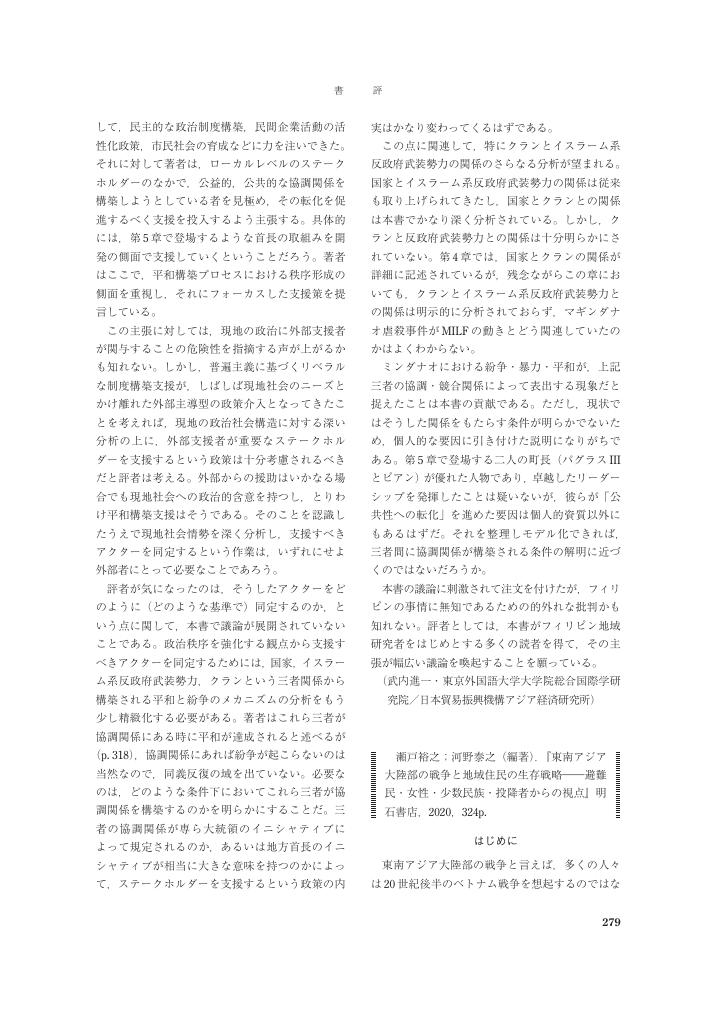- 著者
- 堀内 義隆 下條 尚志 川上 桃子 青木(岡部) まき 池上 健慈
- 出版者
- 独立行政法人 日本貿易振興機構アジア経済研究所
- 雑誌
- アジア経済 (ISSN:00022942)
- 巻号頁・発行日
- vol.63, no.4, pp.61-80, 2022-12-15 (Released:2022-12-26)
- 参考文献数
- 3
2 0 0 0 IR フィールドワーク便り コーヒーとベトナム--ベトナム中部高原の先住民社会とコーヒー栽培
- 著者
- 下條 尚志
- 出版者
- 京都大学大学院アジア・アフリカ地域研究研究科
- 雑誌
- アジア・アフリカ地域研究 (ISSN:13462466)
- 巻号頁・発行日
- no.8, pp.101-106, 2008
- 著者
- 下條 尚志
- 出版者
- 京都大学東南アジア地域研究研究所
- 雑誌
- 東南アジア研究 (ISSN:05638682)
- 巻号頁・発行日
- vol.58, no.2, pp.279-284, 2021-01-31 (Released:2021-01-29)
- 参考文献数
- 5
2 0 0 0 OA メコンデルタにおける支配をめぐるせめぎあい
- 著者
- 下條 尚志
- 出版者
- 京都大学東南アジア地域研究研究所
- 雑誌
- 東南アジア研究 (ISSN:05638682)
- 巻号頁・発行日
- vol.51, no.2, pp.227-266, 2014-01-31 (Released:2017-10-31)
This paper attempts to consider the struggle for reign between local community and state in the Mekong Delta of southern Vietnam during the controlled economy era (1976–88). It examines the influence of the communist government's socialistic reforms on the local community composed of Khmer, Chinese and Vietnamese, and how the people dealt with these reforms. In an attempt to socialize the Mekong Delta region, the government transformed local orders to a new state order, one that prioritized public interest. Local orders were cooperative relations based on private interests of individual or family subsistence and were formed in various places in the local community. The subsistence crisis provoked by the socialistic reforms drove the people to depend on local orders. People hid paddy in their houses, selling it on the black market. Some living in disputed border areas left their village, seeking refuge in Buddhist pagodas, while others escaped to Cambodia. As more and more people, including local officials, participated in local orders, the weaker the state order became. Finally, the authorities were obliged to abolish the socialistic reforms as a result of the people's boycotting.
- 著者
- 下條 尚志
- 出版者
- 京都大学大学院アジア・アフリカ地域研究研究科
- 雑誌
- アジア・アフリカ地域研究 = Asian and African area studies (ISSN:13462466)
- 巻号頁・発行日
- vol.8, no.1, pp.101-106, 2008-09
1 0 0 0 OA ベトナム・サイゴン政権の中部高原統治──先住山地民の土地所有権に対する政策を中心に──
- 著者
- 下條 尚志
- 出版者
- 独立行政法人 日本貿易振興機構アジア経済研究所
- 雑誌
- アジア経済 (ISSN:00022942)
- 巻号頁・発行日
- vol.52, no.5, pp.2-31, 2011-05-15 (Released:2022-09-26)
2017年度はハノイ、フエ、メコンデルタで華人と明郷についての調査を行った。まずハノイでは旧市街の元華人街を中心にインタビューを実施、短期間ではあったがしつこく何度も通ったかいがあり、水面下に残る華人ネットワークをたどって、1978年の中越関係悪化時に中国に戻らず、ベトナムに残っている人たちの証言を得ることができた。その結果、ベトナム人男性と結婚していた華人女性はベトナムに残ることができたが、それ以外の人々はほとんど残ることができず、ほぼ中国へ渡っていることがわかった。中部・南部からも難民となってベトナムから脱出した中国系住民は多いが、ハノイほど徹底して追い出されてはおらず、政治都市ハノイの厳格さと、北部から華人人口の大部分が出国したとされていた通説を確認することにもなった。さらに以前の教育状況や今は政府に接収されてしまっている会館の活動、華僑・華人大量出国の前後の状況など歴史を具体的に明らかにできた。ハノイに残った華人についての調査はこれまでないので貴重な資料を収集できたと言える。通常外部者は入れない、接収され小学校にされている元広東会館の建物内部も見ることができ幸運にも恵まれた。12月にはハノイ大のチン教授と分担者とともに、フエでインタビュー調査、フエ大学で華人に詳しい研究者と交流し文献資料収集を行った。フエは観光客で賑わうホイアンと同様、華人会館などの施設が揃っているにも関わらず、全く観光開発されていない。ホイアンやホーチミン市に比べ華人社会が衰退しつつあり、観光開発に関わるような人材も少ないことがわかった。行政側もフエには王宮関係の施設がたくさんあるために、ベトナム的でない華人施設に注目する必要がないと捉えているようだ。また阮朝に高官として仕えていた明郷の子孫が残っているのも古都の特徴で、抽象的にしか言われていない明郷のかつての活躍ぶりを具体的に明らかにできた。


